Writing Seminars Alums Create Literary Community
We talked to five Writing Seminars alums who plunged into the literary world after their MFAs: one started a publishing company, another founded a writers retreat, while others created a newsletter and two reading series. They all spoke about the power of making new connections and the ongoing relationships that began at Bennington.
By Craig Morgan Teicher
Jessica Danger, MFA ‘16
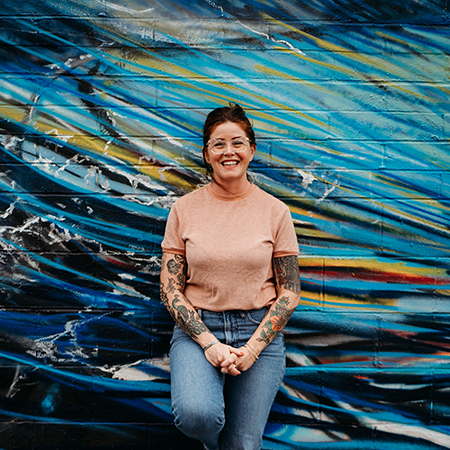 Danger is an Assistant Professor of English at Vanguard University, the Director of Education at Dead Reckoning Collective, and co-founder of Joshua Tree Writers Retreat. She was nominated for the Lucy Grealy Nonfiction Prize, was a finalist for the Iowa Review Nonfiction Prize and also the 2024 Literary Awards. Her work has been published widely, with pieces forthcoming in The Sun and in Oh, Reader. Her memoir, No Heroic Measures, will be published in Spring 2026 by the Santa Fe Writers Project. She lives in Southern California with her husband, Keith Dow, and their family.
Danger is an Assistant Professor of English at Vanguard University, the Director of Education at Dead Reckoning Collective, and co-founder of Joshua Tree Writers Retreat. She was nominated for the Lucy Grealy Nonfiction Prize, was a finalist for the Iowa Review Nonfiction Prize and also the 2024 Literary Awards. Her work has been published widely, with pieces forthcoming in The Sun and in Oh, Reader. Her memoir, No Heroic Measures, will be published in Spring 2026 by the Santa Fe Writers Project. She lives in Southern California with her husband, Keith Dow, and their family.
How and why did you start Joshua Tree Writers Retreat?
Keith Dow and I started the Joshua Tree Writers Retreat because we wanted to give back to the same greater literary community that supports us. Keith and I have been directing and leading writing retreats all over the country since 2021. We found what would become the Joshua Tree Writers Retreat by accident. We held the Fall 2023 Dead Reckoning Writer's Workshop in October in Joshua Tree and spent five days out there in the desert reading, writing, working out, hiking, and being in just the right place at just the right time.
I like to say we "zinged" when we first stepped foot on the property in Joshua Tree. It had a presence to it. Keith and I went home that night and I asked him, "are we really going to do this?" And then we did it! Keith and I decided that from the beginning we wanted to be family and pet friendly and short term. Not everyone can leave their whole life behind for six months to write. We want space for the writers who have dependents and responsibilities that might make it more difficult for them to experience writing retreats the way other writers might be able to.
Can you talk about the community that’s growing around the Retreat?
We have made so many connections in Joshua Tree these last two and a half years. It was really important to us that we not just come into town and draw on the community's creative sources. There are so many creatives in the desert. We've worked quite diligently to join the community. We've hosted the Desert Book Club, we've participated in 29 Palms Book Festival two years in a row, and we attend monthly community breakfasts. We are holding a community barbecue in August and hosting a "back to school planning" event with artistic journaling in September with the local community college.
But the connection in the larger literary community has also been eye opening. We've had residents come all the way out from New York, from New Jersey, from Texas. We had our first international applicant in April. Another writer cried when she finished the edits for her first book at Joshua Tree Writers Retreat. Whenever we start to feel a little bit underwater on this project, something shows us that we are in alignment and it just kind of re-energizes us.
I have been greatly supported by other institutions and organizations during my writing career—Dorland Arts Colony, Community of Writers, and Bennington—and it is important to me that I offer support in return wherever I can.
Can you talk a bit about your experience at Bennington and how it’s influenced your work on the Retreat?
Our very first writer-in-resident was none other than Megan Galbraith, our director. Another BWS alumni, David Schwartz, is currently our writer-in-residence. Mollie Hawkins, our social media wizard, has applied and been accepted to JTWR. Faculty member Claire Vaye Watkins lives just on the other side of the desert from JTWR. Alumni and founder of Prospect Street V. Hansmann took me to lunch and let me ask him a million questions about literary fundraising and paperwork. Bennington is everywhere and I love that!
One of the things I learned at Bennington is that community and good literary citizenship is everything. The perfect literary bubble of Bennington residencies doesn't actually end at graduation. If anything, it kind of slingshots you into your next dimension and then it sticks around to make sure you're doing okay. I'm doing okay, and now I want to make sure I can help other writers also be doing okay.
Chelsea Hodson, MFA ‘17
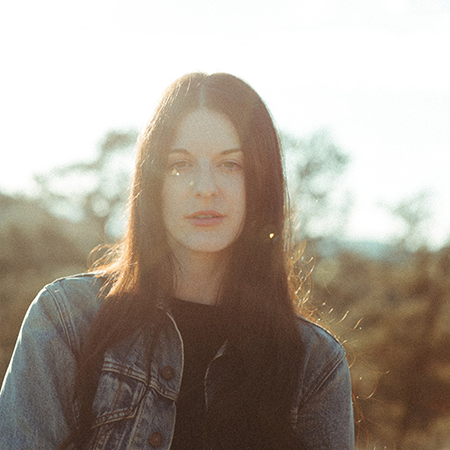 Hodson is the author of the essay collection Tonight I'm Someone Else (Holt, 2018), recently founded the small press Rose Books, and is also the founder of Morning Writing Club. She lives in Sedona, Arizona.
Hodson is the author of the essay collection Tonight I'm Someone Else (Holt, 2018), recently founded the small press Rose Books, and is also the founder of Morning Writing Club. She lives in Sedona, Arizona.
How and why did you start Rose Books?
I had read and edited early drafts of Geoff Rickly's debut novel Someone Who Isn't Me and I felt certain it was an important book that would resonate with anyone who read it. When I heard from Geoff that he was encountering difficulty finding a publisher, I thought it was a sign for me to start the press I'd been thinking about maybe starting someday. I asked, "Do you want to do this with me?" and he immediately said yes, trusting that I could bring the book into the world in an interesting way. With that, I lined up two other books I was excited about (The Holy Day by Christopher Norris and Fake Piñata by Ashleah Gonzales), and I set about learning about how to publish books. Since its release date in 2023, Rose Books has sold over 10,000 copies of Geoff's novel.
How do your various projects fit together?
I started the Morning Writing Club as a way to fund the costs associated with starting and running Rose Books, and that's been very successful, both in terms of finding a way to fund an indie press outside of grants and in terms of building a community. Many of us meet every weekday morning to write together on Zoom (off-camera), and I've met hundreds of writers through the club. Rose Books also recently published our first Rose Books Reader, which lands somewhere in between a magazine and an anthology, and that made me excited to publish more short-form work in that way. Running a press is often very difficult and stressful, but it's so satisfying to feel like I'm contributing to a culture that I actually want to be a part of.
Any lessons from your time at Bennington that have been helpful?
I always say that being in a workshop setting helped me to become the editor I am today. I still remember my first Bennington workshop and feeling like it was easy for me to decide like I either "liked" or "disliked" a piece being workshopped, but it was often difficult for me to articulate why I felt a certain way. I didn't yet have confidence in my editorial eye, but that changed with enough practice. I also met my Rose Books Managing Editor Katie Coleman at Bennington, just in passing. I later met her again in a Zoom workshop I taught, and realized what a powerful editorial eye she had. In the literary world, you never know who is going to come back into your life in an important way, and that's certainly been true of my time at Bennington.
Etan Kerr-Finell, MFA ‘24
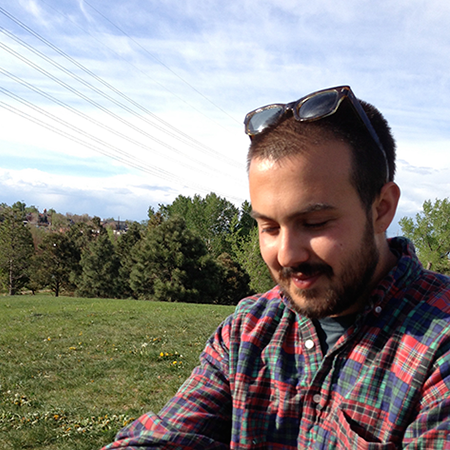 Etan Kerr-Finell has published poems in The Cimarron Review and recently published a critical essay published on Michael Theune’s blog Structure And Surprise. He lives in the Hudson Valley and writes the Substack Newsletter Literary Things in the Hudson Valley.
Etan Kerr-Finell has published poems in The Cimarron Review and recently published a critical essay published on Michael Theune’s blog Structure And Surprise. He lives in the Hudson Valley and writes the Substack Newsletter Literary Things in the Hudson Valley.
How and why did you start Just Submit for Literary Things in the Hudson Valley?
As I was finishing at Bennington I knew that maintaining a sense of accountability and community were going to be really important for me. To create a system of accountability, I started Just Submit, a free submission club for writers to submit work to magazines, contests, and grants that meets on Zoom every two weeks.
I am lucky to be in a region in the Hudson Valley with quite a few Bennington MFA alumni and many world class writers. There are a lot of readings, but the events are often not publicized very well. After missing a few incredible authors, I began to search regularly and compile a list of events. For a long time, I emailed a list to local faculty and students from Bennington, but eventually, at the urging of Kelly Marages, I created this newsletter, which has been a great way to connect to other writers in the area.
What kinds of connections are you making through the newsletter?
The newsletter has been really fun. Through it, I get to see friends from Bennington and meet all the incredible people in the area who want to be at a poetry reading on a Tuesday night. People who like to talk about books are my kind of people, and this is a great way to hang out with those people.
Ariél M. Martinez, MFA ‘22
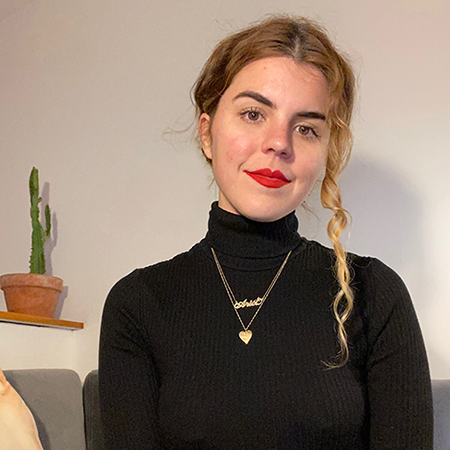 Martinez, a queer femme writer from San Antonio, Texas, is working on a book of memoir/ criticism about Britney Spears, failure, and femininity. Her work has appeared in The Seneca Review, The Rumpus, Interview Mag and other publications. Ariél hosts a queer monthly reading series, PERFUME, in Brooklyn, where she lives with her two bisexual chihuahuas.
Martinez, a queer femme writer from San Antonio, Texas, is working on a book of memoir/ criticism about Britney Spears, failure, and femininity. Her work has appeared in The Seneca Review, The Rumpus, Interview Mag and other publications. Ariél hosts a queer monthly reading series, PERFUME, in Brooklyn, where she lives with her two bisexual chihuahuas.
How and why did you start your Substack and reading series?
Both my Substack, all the things she said, and the reading series were created out of my love for queer people and women. On Substack I highlight books I love, almost entirely by queer and/or women authors. I've long been the friend everyone asks what book to bring on a trip, so it seemed like a natural progression of what I was already doing. The Substack has evolved to include book recommendations from other writers, and I'm toying with the idea of hosting interviews as well.
PERFUME is a recent development: a monthly cross-genre queer reading series at a gay bar here in Brooklyn; I ask participants to write something new based on a theme. The first prompt was "fantasy" and the next was "heaven." I wanted a space for people to share new work or work in flux. I was interested in creating an event where people are forced, or ahem, encouraged, to write something new because I know a deadline can be helpfu–and I'm interested in the ephemerality of the project. If the writing turns into something longer or published, that's great obviously—but it's really a way to get people I admire thinking about things I'm interested in. Selfish! Also, my own book-length project—a memoir crossed with a critical take on Britney Spears—came out of a friend asking me to write something for his book launch (on food, no less), so I was inspired by my own experience.
What has surprised you about the response to the Substack and PERFUME?
I thought more people would say “no” to being on the Substack or to reading at PERFUME but so far only one author has said no to the Substack–or her marketing team did. One of the consistent joys in my life is being in community with other artists and especially writers. I love thinking with people—there's nothing better than feeling my own writer's brain activate at a book suggestion or feeling inspired while listening to the shapes a poem makes when read aloud. I doubted other people would want to be involved with my projects but I have been pleasantly surprised by how many people have said “yes”—to writing something new and reading it in front of people.
Any lessons from your MFA?
I had never been in a writer community before Bennington. The exposure to so many readings and meeting so many writers and receiving great book suggestions absolutely contributed to me starting these projects. Bennington was crucial in my understanding of myself as a writer, a descriptor I shied away from prior to being in the program. I have had Bennington alumni on the Substack (you’ll spot some familiar names in this Valentine's Day post), and recent graduate Marian Bull read at PERFUME in July (on the theme "feral")!
Nikki Volpicelli, MFA ‘24
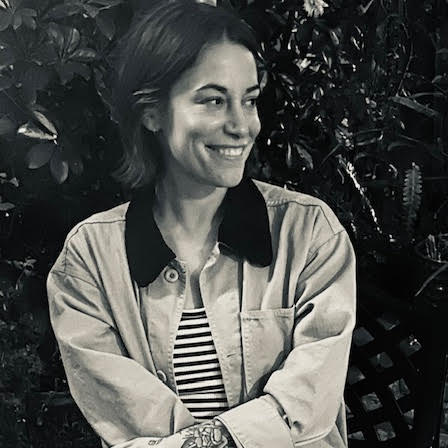 Volpicelli is a short story writer whose work has appeared in Electric Literature, Vice, Nylon, Glamour, Neutral Spaces, XRAY, Entropy, Consequence of Sound, and other venues. In 2023, she was shortlisted for The Masters Review Summer Short Story Award for New Writers and longlisted for the Craft Literature Short Story Award. She runs the Good Work reading series.
Volpicelli is a short story writer whose work has appeared in Electric Literature, Vice, Nylon, Glamour, Neutral Spaces, XRAY, Entropy, Consequence of Sound, and other venues. In 2023, she was shortlisted for The Masters Review Summer Short Story Award for New Writers and longlisted for the Craft Literature Short Story Award. She runs the Good Work reading series.
How and why did you start the Good Work series?
Good Work is held the last Thursday of every month at The Common Good, a bookstore that's near and dear to me, which opened just last year. Even before the shop opened, I was knocking on the door and asking to put on a reading series. I mean this literally: I even helped stack the shelves.
My personal goal was to give myself a deadline each month as I worked through writing my first novel, and to practice reading it outloud to make sure it had a good mouth-feel. My community goal was to provide a space for writers in the Southern Catskills to meet, share work, and talk about literature. I was jealous of the literary events in Hudson, Kingston, Catskill—all a bit of a hike from Southern Ulster and Sullivan County—so I made my own.
What have you learned about literary community through curating the series? What kinds of connections are you making?
My favorite thing that happens is when someone who's never read in front of an audience does so for the first time, gets the bug, and signs up for the next month before the night is over. Or, when someone who just moved to town finds us and sticks around after the reading to get to know others from the neighborhood. Or when friends from Bennington come to read their work and it feels a little bit like we're back on campus.
How do you feel like your Bennington MFA and the Writing Seminars community or education helped or inspired you to start this series, and in what ways does it connect you to Bennington?
I was inspired by the student readings held almost nightly during residency. I always knew I wanted this series to be casual and sort of lawless in terms of genre, theme, etc., but with a set reading time and the understanding that it's a space to work through work, not share your polished best. The student readings were some of my favorite events on campus. You got to know your cohort and peers deeply in the three minutes or so they had to read. You were able to pull them aside afterward and gush about this or that, and that always felt special. Good Work feels that way.
Something that I never could've guessed when putting together this series is that Good Work has also become a sort of Bennington reunion of sorts, with friends from all over coming to read, have a drink, and catch up. I think that says a lot about the program and the people in it. The community is so strong, they'll drive an hour-and-a-half to your little bookstore reading in the dead of a six-month long winter. Who does that!? GOOD people only.
Photo of Nikki Volpicelli by Amy Raasch